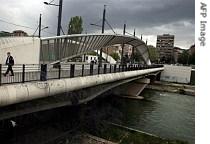2007年VOA标准英语-Uncertainty About Kosovo's Future Leaves Somber(在线收听)
Mitrovica, Kosovo
10 August 2007
Mitrovica is the second largest city in Kosovo and the only place in the mostly ethnically Albanian province where minority Serbs comprise a sizeable urban presence. VOA's Barry Wood visited Mitrovica, a city divided ethnically by the Ibar River where security is provided mostly by French soldiers of the 16,000-strong NATO-led force that is posted in the disputed south Serbian province.
 |
| Kosovo police patrol on the main bridge of the ethnically divided town of Mitrovica |
Across the bridge in the more populous ethnic Albanian south there is a bit more activity, but not much. An occasional French or Austrian vehicle from the NATO led security force passes by. People take little notice.
On the south side adjacent to the river the United Nations regional headquarters occupies a concrete building that still bears the name Yugobanka. Jerry Gallucci, a retired American diplomat, is the U.N. administrator in Mitrovica. He says that the mood has darkened since Russian opposition last month blocked Security Council implementation of the plan for Kosovo's conditional independence.
"I think this uncertainty is dangerous," he said. "And I think the only way to get through this is for the international community to find a way to move forward."
Gallucci concedes that with the plan for conditional independence on hold, there is again talk of territorial partition as a solution to Kosovo's disputed status.
"People certainly are talking a lot more about partition these days," he said. "I think probably most people in the north, if they don't talk about it they dream about it. Although they also recognize it would not be a solution for the Serbs in the south."
Serbs number only 130,000 of Kosovo's nearly two million population. Half of Kosovo's Serbs live in north Mitrovica and its hinterland up to the border of Serbia proper. The plan for Kosovo's supervised independence would provide considerable local autonomy to the Serbs in the north. Gallucci makes no secret of his opposition to early elections in Kosovo, something advocated by some ethnic Albanian political leaders.
"Without agreement on all parties on participating in elections, it could mean that the elections produce outcomes that in fact don't help unify Kosovo but help divide it," he said.
Gallucci believes it would be a mistake to have elections in Kosovo before the newest round of status negotiations are concluded in December. If elections are called, Serb voters in the north might be asked by Belgrade to stage a boycott, an action which could leave northern Kosovo's municipalities without legitimate leaders.